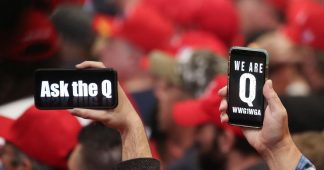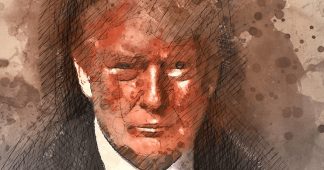The Digital General
How Trump Ally Michael Flynn Nurtured — and Profited From — the QAnon Conspiracy Theory
By Candace Rondeaux
Jun 27, 2021
Of the many mysteries surrounding the final days of Donald Trump’s presidency, few have been more confounding than the connections between former national security adviser Michael Flynn, the QAnon conspiracy theory, and Trump’s #StoptheSteal campaign.
Most media outlets treated Flynn’s videotaped oath last summer, in which he uttered a well-known QAnon slogan, as a sort of coming-out story about a onetime Trump insider who had gone off the rails. The video has since become the subject of a lawsuit by members of Flynn’s family who claim that “left-wing media outlets began to spread false narratives” about the Flynn family’s connections to QAnon. An Intercept investigation has found that Flynn’s ties to the QAnon phenomenon stretch back much further than the July 4 weekend last year when the video first appeared, however, to the days immediately following Trump’s 2016 election victory.
That November, nearly a year before the first cryptic clue from QAnon’s organizers – known as a “Q drop” — appeared on the online message board 4chan, Flynn told a roomful of Trump supporters that the president-elect had been borne into office by an “army of digital soldiers.” The phrase “digital soldiers,” which Flynn later trademarked, has become a central QAnon rallying cry and a key indicator of the movement’s growing turn toward violent extremism and insurrection.
Flynn, a retired Army lieutenant general who once oversaw military intelligence in Afghanistan and led a sprawling intelligence agency in Washington, would go on to become a central hero in QAnon’s conspiratorial narrative. But his move to trademark the term “digital soldiers” — ensuring that only he and others who obtain his express permission can profit from the sale of “Digital Soldiers”-branded merchandise — hints at his attempt to capitalize on a marketing and communication strategy that resonates with the Q community.
Flynn hitched his financial fortunes to QAnon at least as early as the summer of 2019, when he was facing a mountain of legal costs, The Intercept’s investigation found. His push to leverage QAnon’s viral popularity with the far-right coincided with his efforts to reverse his guilty plea for lying to the FBI in special counsel Robert Mueller’s probe.
The money-making virtual empire that Flynn, his lawyer Sidney Powell, and other Trump loyalists have built on the back of the QAnon phenomenon has long been hiding in plain sight. But in the wake of the January 6 assault on the U.S. Capitol by Trump supporters, disinformation researchers began digging into the tangle of financial, legal, and business relationships that have fueled the growth of a far-right conspiracy theory the government has classified as a serious threat. Data and records reviewed by The Intercept for this report were provided by the January 6 Research Consortium, a joint initiative of New America and Arizona State University focused on investigating social media’s role in contributing to election-related violence at the Capitol and across the country.
What began with the launch of Flynn’s legal defense fund in 2017 has morphed into an intricate network of conspiracy-promoting websites and companies. Among the firms linked to Flynn and his surrogates, including Powell, are entities registered in Florida, Virginia, and Texas, some of which are inactive; they include a political action committee and a related firm now at the center of a $1.3 billion libel lawsuit connected to the 2020 presidential election.
Flynn, Powell, and their lawyers did not respond to multiple requests for comment
Published at theintercept.com











